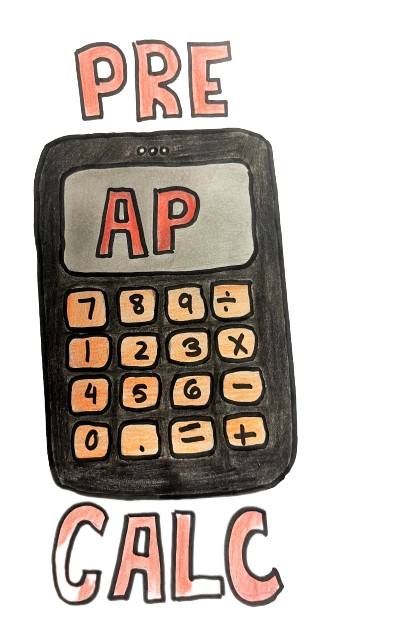AP Precalculus Will Ultimately Benefit High School Students
While students were preparing for their upcoming Advanced Placement (AP) exams in May, the College Board was working behind the scenes to develop a new AP course to offer in the 2023-24 school year: AP Precalculus. The exam for this course will be structured similarly to the current AP Calculus exams; the three-hour test will consist of 40 multiple choice questions (28 non-calculator and 12 calculator) in addition to four free response questions (two non-calculator and two calculator).
Perhaps the first thoughts to enter one’s mind when hearing about AP Precalculus—created by a supposed non-profit organization that charges $97 per exam—are ones of suspicion. Is this new course merely another way for the College Board to make more money? The answer: almost definitely. However, the potential benefits to students will hopefully prove to outweigh the greed of the College Board and ultimately improve their high school math experiences.
At LHS, the course will most likely be taught by current precalculus teachers Maria Mantikas and Kerri Hanley. The curriculum for AP Precalculus will be similar to the previous curriculum for precalculus honors, according to Mantikas. “The only big difference—calculators!” she exclaimed. Previously, precalculus students were forbidden from using calculators, but with AP Precalculus, they will have access to them for part of the year. “That’ll be a benefit to any kid who goes into AP Calculus because they’ll already be somewhat familiar with the TI-89,” Mantikas shared.
However, although the curriculum will not stray far from what it has been in the past, Mantikas and Hanley are left in a difficult position—not having previous AP Precalculus exams to reference. “Currently, we are offering the course next year without any knowledge or resources of past exams. This will make it more of a guessing game on how [the College Board] will ask questions,” Hanley explained. Mantikas added, “You can go back and look at old AP World or AP Calculus exams, but there’s no history [for AP Precalculus]. You never know what the College Board is going to do, and you never know what curveballs they’re going to throw.”
Despite the unknown factors of the exam, it will allow students to earn more AP credits, granting that they perform well. With the accumulation of enough credits, students may be able to skip entry-level mathematics courses in college or dedicate their time to more major-oriented classes, thus saving money—and time. Additionally, David Bressoud, a member of the advisory board for AP Precalculus, admitted in his article featured on the Mathematical Association of America’s Math Values blog (www.mathvalues.org) that “AP courses on a transcript do improve the prospect of admission to the college of one’s choice.”
Additionally, AP Precalculus will be a good way for students who are not on a path to take AP Calculus to get an AP credit for math. “It’ll give kids that might be too scared for AP Calculus, or kids that didn’t accelerate in eighth grade and are going to be seniors, to get an AP credit in math,” Mantikas shared. “[AP Precalculus] gives AP exposure to some students who may not be interested in taking AP Calculus in their senior year,” Hanley agreed.
Additionally, this new AP credit in the mathematics department may discourage students from prematurely rushing into AP Calculus merely for prestige. “It will take some of the pressure off getting into AP Calculus in high school, especially from students who now skip precalculus in high school so that they can get AP Calculus onto their transcript,” Bressoud explained in his article. Many educators agree that taking a course students are unprepared for is detrimental to their understanding of the course; in fact, the University of California Board of Admissions and Relations (BOARS) released a statement regarding the matter: “BOARS strongly urges students not to race to calculus at the cost of full mastery of the earlier math curriculum. Choosing an individually appropriate course of study is far more important than rushing into advanced classes without first solidifying conceptual knowledge.” The board further noted that students that take courses mismatched to their ability level “often become frustrated and lose interest in the topic.”
Another possible benefit of AP Precalculus—better preparing students for calculus. This will be achieved mainly through the standardization of the precalculus curriculum, which has been left up to teachers to decide in the past. “There’s been no standard precalculus curriculum in New York State or anywhere. Precalculus has been the wild, wild west of math,” Mantikas said. However, if students across the globe are being taught the same set of precalculus skills outlined by the College Board, perhaps the playing field will be leveled, and more students will be adequately prepared for calculus or other college mathematics. “[AP Precalculus] should help to improve the quality of precalculus as taught in high school since it would bring with it a clear set of expectations for what students will learn,” Bressoud wrote.
Despite the positive aspects of offering AP Precalculus, students still must be wary of overloading themselves by taking too many AP courses; junior year, presumably when many students will take AP Precalculus, is notoriously difficult, with the number of APs students can take jumping from one or two to about four. “I like the idea of AP Precalculus to offer another AP to students; however, students need to be mindful of how many AP [courses] they are able to be successful in each year,” Hanley explained.

I am a member of the Class of 2023 as well as one of the editors-in-chief of the print edition of Horizon. I enjoy reading, playing the violin, and using...

Hi! I am a member of the Class of 2026 and an arts and graphics editor for Horizon. I am also a member of the Student Diversity club and the publicist...


















